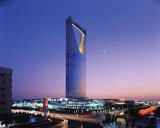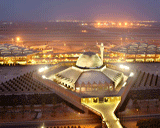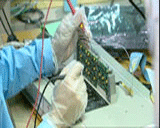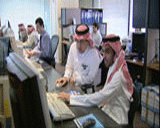 Saudi Arabia is the largest free market economy in the Middle East and North Africa holding 25% share of the total Arab GDP. The Kingdom’s geographic location provides easy access to export markets in Europe, Asia and Africa. It has a continuously expanding domestic market (annual population growth of 3.5 percent), which is adding to a young and consuming population with strong buying power. The investment environment in the Kingdom reflects traditions of liberal, open market private enterprise policies and its new Foreign Investment Law allows 100 percent foreign ownership of projects and real estate. The Kingdom has an impressive record of political and economic stability and has a modern world-class infrastructure.
Saudi Arabia is the largest free market economy in the Middle East and North Africa holding 25% share of the total Arab GDP. The Kingdom’s geographic location provides easy access to export markets in Europe, Asia and Africa. It has a continuously expanding domestic market (annual population growth of 3.5 percent), which is adding to a young and consuming population with strong buying power. The investment environment in the Kingdom reflects traditions of liberal, open market private enterprise policies and its new Foreign Investment Law allows 100 percent foreign ownership of projects and real estate. The Kingdom has an impressive record of political and economic stability and has a modern world-class infrastructure. Saudi Arabia has the biggest oil reserves in the world (25 percent). The Kingdom is endowed with other natural resources including a wide range of industrial raw materials and minerals such as bauxite, limestone, gypsum, and phosphate and iron ore. There are no restrictions on foreign exchange and repatriation of capital and profits. It has a very stable currency and has no foreign exchange curbs, and companies are allowed 100 percent repatriation of profits. The Kingdom is among the few countries in the world that allows companies to carry forward losses indefinitely, effectively relieving businesses of the tax burden until they become profitable. The Kingdom does not impose personal income tax. Labor cost in almost all spheres is low. Additional incentives offered to investors include:
Exemption of export goods from storage fees for 10 days. Annual land rent in industrial areas fixed at 2 US cents/square meter. Cut in corporate tax by 30 percent. 50 percent cut in port fees on all exports. Exemption of industrial machinery and equipment from duties.
Petrochemicals and downstream industries
- Natural gas extraction and distribution
- Water desalination
- Electrical power generation

- Information Technology
- Infrastructure
- Industrial equipment and spare parts
- Mining
- Tourism
Emerging economy
Saudi Arabia is fully committed to increasing private sector participation in economic growth. Privatization is a key element of the Kingdom’s economic liberalization and a host of sectors are being opened to the private sector. Telecommunications, electricity, airlines, postal services, railways, port services and water utilities are some of the potential areas for investment.
The Kingdom proposes to invest $200 billion in the oil, gas, electricity and desalination and petrochemical industries. Global oil companies are also considering investing $100 billion over a period of 20 years in the production of natural gas. It is also expected that $6 billion worth of domestic capital will be invested in the tourism sector. Saudi Arabia is a founding member of Convention on Arbitration and is in the process of obtaining World Trade Organization (WTO) membership. The Kingdom is also a member in numerous other international and regional organizations.
Saudi Arabia’s privatization and economic diversification efforts have gained momentum since the creation of the new Supreme Economic Council (SEC). The purpose behind the creation of the SEC is to speed up economic reforms aimed at opening Saudi markets and ensure stability for investors. The SEC has been officially responsible for the Kingdom’s privatization efforts since early 2001. It plays a supervisory role in the formulation of economic policy, managing the budget and coordinating the implementation of policies between government departments and agencies. The SEC evaluates economic, industrial, agricultural and labor policies to assess their effectiveness and impact on the national economy, diversification of the country’s economic base and the growth of its competitive economic strength.
Foreign trade
Saudi Arabia’s foreign trade totals US $ 78 billion. It is the world's 25th exporter / importer. Export markets have expanded tremendously following bilateral trade agreements with numerous countries in the region. Saudi Arabia benefits from international and regional trade financing and export guarantee programs offered by the Islamic Development Bank (IDB), the Arab Monetary Fund's Trade Financing Program for financing trade and the Arab Investment Guarantee Corporation's program for ensuring exports and investments. USA, Japan, China, South Korea, Germany, France, Britain, Italy, Singapore, India, Holland, UAE and Switzerland are amongst Saudi Arabia's leading foreign trade partners.
Saudi Arabia’s non-oil exports increased by 4.3 percent to reach 7 billion in 2001 from $ 6.6 billion in 2000. The Kingdom’s total imports were $ 30.3 billion in 2000, an increase of 8 percent from $ 28 billion in the previous year. The government has reduced tariffs from 12% to 5% and efforts are on to accelerate GCC tariff harmonization, which will be effective in 2003.
The new Foreign Investment Law allows foreigners to invest in most sectors of the economy. Business activities that are closed to foreigners for a variety of reasons are specified in a negative list . The law has abolished the sponsor system and enabled foreign investors to own real estate for company activities and sponsor their foreign employees. The new Real Estate Law allows foreigners to own real estate except in the two Holy cities of Makkah and Madinah. The Kingdom is drastically revising its business-related laws to increase transparency and strengthen the country’s global competitiveness. The laws currently under revision include the Capital Markets Law, the Companies Law, the Agency Law, the Insurance Law, the Mining Law and the Labor Law. Several laws are currently under revision with the aim of pushing forward the process of economic liberalization. In May 2001 the government also issued guidelines for transparency of economic and fiscal data.
Human resource
If youth means potential, Saudi Arabia has plenty of it. Demographic reality of educated and trained youth coupled with the government’s emphasis on developing human resources offer distinct possibilities for foreign investors. Joint ventures with the Saudi government and the private sector have groomed a generation of managers and technocrats. Today’s situation offers tremendous opportunities for training and development.
There has been a rise in the number of young Saudi professionals graduating from Saudi universities . The government has created the Human Resources Fund for job skill training for Saudi youth. The Kingdom allows businesses to recruit from overseas if necessary. There are around six million skilled and semi-skilled expatriate workers in the Kingdom, from senior managerial level to laborers. Unskilled labor in Saudi Arabia costs US$2.77/hr compared to US$2.63/hr in Mexico and US$22.60/hr in France. The Kingdom offers substantial public and private educational institutions and Research and Development facilities. The private sector also runs major vocational/professional institutes.
Financial sector
Saudi Arabia has established a sound regulatory and financial infrastructure based on financial standards and payment systems equivalent to those in major industrial countries. This has resulted in a strong banking sector that benefits from management expertise and the most sophisticated technologies. The sector offers diverse financial services to the growing commercial sector. The reliability of this financial infrastructure and the size of the Saudi market make the Kingdom an attractive investment destination.
The Kingdom’s financial system consists of the central bank (SAMA, the Saudi Arabian Monetary Agency ), the commercial banks, the specialized credit institutions and the stock market. Banking is regulated under the Banking Control Law issued by Royal Decree in 1966. The Council of Ministers issues licenses for the establishment of banks, based on recommendations from the Minister of Finance and National Economy after review by the central bank.
The government stake in commercial banks is less than 10%. Sufficient liquidity enables financing at equitable rates. Foreigners can invest in the stock market through investment funds. The Saudi stock market is the largest in the region. The Saudi Riyal has a strong record of stability and inflation rates in Saudi Arabia are very low. The Kingdom is signing bilateral agreements with an increasing number of countries to provide relief from double-taxation.
Incentives to investors
Saudi Arabia is a signatory to various regional agencies guaranteeing a level playing field to foreign investors. It is a member of the Multilateral Investment Guarantee Agency (MIGA). The Kingdom, hence, ensures the same treatment, protection and incentives accorded to a national capital. The pre-investment assistance provided by SAGIA and other government agencies includes helping foreign investors prepare feasibility studies for industrial projects. They also provide information and statistics for investment projects within the scope of Saudi Arabia’s development plans. Land for setting up industrial units are available throughout the Kingdom in several industrial cities. The land can be acquired on lease or sale at nominal charges.
The government makes electricity, water and fuels available to industrial projects at low prices. Industrial parks have public utilities like roads, desalinated water, telephones, police stations, restaurants and postal services. Commodities entering the Kingdom as input for industrial production and some basic foods are exempted from custom duties. Duties on other products range from 5 percent to 20 percent. The Saudi Industrial Development Fund (SIDF) gives soft, medium and long-term loans to industrial establishments for up to 50 percent of the total cost of the project. The payback period is up to 15 years. There is also a two-year grace period from the start of production
